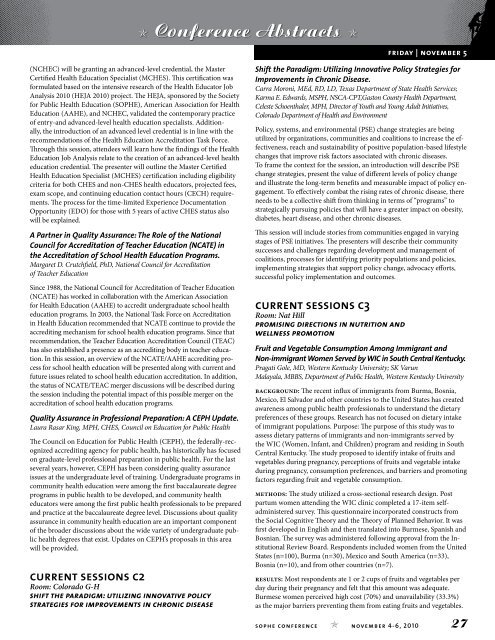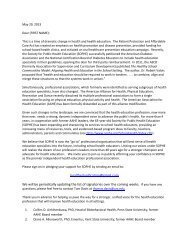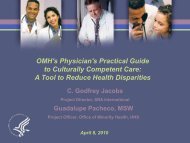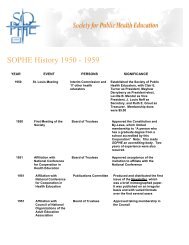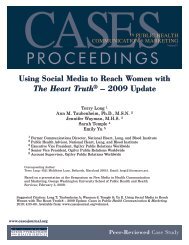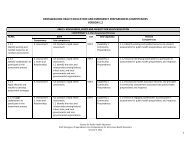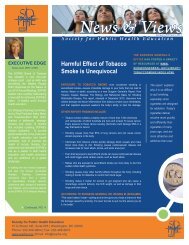healthy people 2020 - Society for Public Health Education
healthy people 2020 - Society for Public Health Education
healthy people 2020 - Society for Public Health Education
You also want an ePaper? Increase the reach of your titles
YUMPU automatically turns print PDFs into web optimized ePapers that Google loves.
✯ Conference Abstracts ✯<br />
friday | november 5<br />
(NCHEC) will be granting an advanced-level credential, the Master<br />
Certified <strong>Health</strong> <strong>Education</strong> Specialist (MCHES). This certification was<br />
<strong>for</strong>mulated based on the intensive research of the <strong>Health</strong> Educator Job<br />
Analysis 2010 (HEJA 2010) project. The HEJA, sponsored by the <strong>Society</strong><br />
<strong>for</strong> <strong>Public</strong> <strong>Health</strong> <strong>Education</strong> (SOPHE), American Association <strong>for</strong> <strong>Health</strong><br />
<strong>Education</strong> (AAHE), and NCHEC, validated the contemporary practice<br />
of entry-and advanced-level health education specialists. Additionally,<br />
the introduction of an advanced level credential is in line with the<br />
recommendations of the <strong>Health</strong> <strong>Education</strong> Accreditation Task Force.<br />
Through this session, attendees will learn how the findings of the <strong>Health</strong><br />
<strong>Education</strong> Job Analysis relate to the creation of an advanced-level health<br />
education credential. The presenter will outline the Master Certified<br />
<strong>Health</strong> <strong>Education</strong> Specialist (MCHES) certification including eligibility<br />
criteria <strong>for</strong> both CHES and non-CHES health educators, projected fees,<br />
exam scope, and continuing education contact hours (CECH) requirements.<br />
The process <strong>for</strong> the time-limited Experience Documentation<br />
Opportunity (EDO) <strong>for</strong> those with 5 years of active CHES status also<br />
will be explained.<br />
A Partner in Quality Assurance: The Role of the National<br />
Council <strong>for</strong> Accreditation of Teacher <strong>Education</strong> (NCATE) in<br />
the Accreditation of School <strong>Health</strong> <strong>Education</strong> Programs.<br />
Margaret D. Crutchfield, PhD, National Council <strong>for</strong> Accreditation<br />
of Teacher <strong>Education</strong><br />
Since 1988, the National Council <strong>for</strong> Accreditation of Teacher <strong>Education</strong><br />
(NCATE) has worked in collaboration with the American Association<br />
<strong>for</strong> <strong>Health</strong> <strong>Education</strong> (AAHE) to accredit undergraduate school health<br />
education programs. In 2003, the National Task Force on Accreditation<br />
in <strong>Health</strong> <strong>Education</strong> recommended that NCATE continue to provide the<br />
accrediting mechanism <strong>for</strong> school health education programs. Since that<br />
recommendation, the Teacher <strong>Education</strong> Accreditation Council (TEAC)<br />
has also established a presence as an accrediting body in teacher education.<br />
In this session, an overview of the NCATE/AAHE accrediting process<br />
<strong>for</strong> school health education will be presented along with current and<br />
future issues related to school health education accreditation. In addition,<br />
the status of NCATE/TEAC merger discussions will be described during<br />
the session including the potential impact of this possible merger on the<br />
accreditation of school health education programs.<br />
Quality Assurance in Professional Preparation: A CEPH Update.<br />
Laura Rasar King, MPH, CHES, Council on <strong>Education</strong> <strong>for</strong> <strong>Public</strong> <strong>Health</strong><br />
The Council on <strong>Education</strong> <strong>for</strong> <strong>Public</strong> <strong>Health</strong> (CEPH), the federally-recognized<br />
accrediting agency <strong>for</strong> public health, has historically has focused<br />
on graduate-level professional preparation in public health. For the last<br />
several years, however, CEPH has been considering quality assurance<br />
issues at the undergraduate level of training. Undergraduate programs in<br />
community health education were among the first baccalaureate degree<br />
programs in public health to be developed, and community health<br />
educators were among the first public health professionals to be prepared<br />
and practice at the baccalaureate degree level. Discussions about quality<br />
assurance in community health education are an important component<br />
of the broader discussions about the wide variety of undergraduate public<br />
health degrees that exist. Updates on CEPH’s proposals in this area<br />
will be provided.<br />
current sessions c2<br />
Room: Colorado G-H<br />
shift the paradigm: utilizing innovative policy<br />
strategies <strong>for</strong> improvements in chronic disease<br />
Shift the Paradigm: Utilizing Innovative Policy Strategies <strong>for</strong><br />
Improvements in Chronic Disease.<br />
Carra Moroni, MEd, RD, LD, Texas Department of State <strong>Health</strong> Services;<br />
Karma E. Edwards, MSPH, NSCA-CPT,Gaston County <strong>Health</strong> Department,<br />
Celeste Schoenthaler, MPH, Director of Youth and Young Adult Initiatives,<br />
Colorado Department of <strong>Health</strong> and Environment<br />
Policy, systems, and environmental (PSE) change strategies are being<br />
utilized by organizations, communities and coalitions to increase the effectiveness,<br />
reach and sustainability of positive population-based lifestyle<br />
changes that improve risk factors associated with chronic diseases.<br />
To frame the context <strong>for</strong> the session, an introduction will describe PSE<br />
change strategies, present the value of different levels of policy change<br />
and illustrate the long-term benefits and measurable impact of policy engagement.<br />
To effectively combat the rising rates of chronic disease, there<br />
needs to be a collective shift from thinking in terms of “programs” to<br />
strategically pursuing policies that will have a greater impact on obesity,<br />
diabetes, heart disease, and other chronic diseases.<br />
This session will include stories from communities engaged in varying<br />
stages of PSE initiatives. The presenters will describe their community<br />
successes and challenges regarding development and management of<br />
coalitions, processes <strong>for</strong> identifying priority populations and policies,<br />
implementing strategies that support policy change, advocacy ef<strong>for</strong>ts,<br />
successful policy implementation and outcomes.<br />
current sessions c3<br />
Room: Nat Hill<br />
promising directions in nutrition and<br />
wellness promotion<br />
Fruit and Vegetable Consumption Among Immigrant and<br />
Non-immigrant Women Served by WIC in South Central Kentucky.<br />
Pragati Gole, MD, Western Kentucky University; SK Varun<br />
Malayala, MBBS, Department of <strong>Public</strong> <strong>Health</strong>, Western Kentucky University<br />
background: The recent influx of immigrants from Burma, Bosnia,<br />
Mexico, El Salvador and other countries to the United States has created<br />
awareness among public health professionals to understand the dietary<br />
preferences of these groups. Research has not focused on dietary intake<br />
of immigrant populations. Purpose: The purpose of this study was to<br />
assess dietary patterns of immigrants and non-immigrants served by<br />
the WIC (Women, Infant, and Children) program and residing in South<br />
Central Kentucky. The study proposed to identify intake of fruits and<br />
vegetables during pregnancy, perceptions of fruits and vegetable intake<br />
during pregnancy, consumption preferences, and barriers and promoting<br />
factors regarding fruit and vegetable consumption.<br />
methods: The study utilized a cross-sectional research design. Post<br />
partum women attending the WIC clinic completed a 17-item selfadministered<br />
survey. This questionnaire incorporated constructs from<br />
the Social Cognitive Theory and the Theory of Planned Behavior. It was<br />
first developed in English and then translated into Burmese, Spanish and<br />
Bosnian. The survey was administered following approval from the Institutional<br />
Review Board. Respondents included women from the United<br />
States (n=100), Burma (n=30), Mexico and South America (n=33),<br />
Bosnia (n=10), and from other countries (n=7).<br />
results: Most respondents ate 1 or 2 cups of fruits and vegetables per<br />
day during their pregnancy and felt that this amount was adequate.<br />
Burmese women perceived high cost (70%) and unavailability (33.3%)<br />
as the major barriers preventing them from eating fruits and vegetables.<br />
sophe conference ✯ november 4-6, 2010 27


